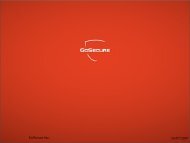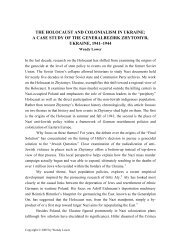Effects of Teachers' Mathematical Knowledge for Teaching on - Apple
Effects of Teachers' Mathematical Knowledge for Teaching on - Apple
Effects of Teachers' Mathematical Knowledge for Teaching on - Apple
Create successful ePaper yourself
Turn your PDF publications into a flip-book with our unique Google optimized e-Paper software.
Hill, Rowan, & Ball<br />
but how this knowledge is used in classrooms. Teachers highly pr<str<strong>on</strong>g>of</str<strong>on</strong>g>icient in<br />
mathematics or writing will help others learn mathematics or writing <strong>on</strong>ly if<br />
they are able to use their own knowledge to per<str<strong>on</strong>g>for</str<strong>on</strong>g>m the tasks they must enact<br />
as teachers, <str<strong>on</strong>g>for</str<strong>on</strong>g> example, to hear students, to select and make use <str<strong>on</strong>g>of</str<strong>on</strong>g> good<br />
assignments, and to manage discussi<strong>on</strong>s <str<strong>on</strong>g>of</str<strong>on</strong>g> important ideas and useful work<br />
<strong>on</strong> skills.<br />
Yet, these additi<strong>on</strong>al c<strong>on</strong>tent-related abilities specific to the work <str<strong>on</strong>g>of</str<strong>on</strong>g><br />
teaching have not been measured or included in the educati<strong>on</strong>al producti<strong>on</strong><br />
functi<strong>on</strong> models. Harbis<strong>on</strong> and Hanushek (1992), <str<strong>on</strong>g>for</str<strong>on</strong>g> instance, administered<br />
the same fourth-grade math assessment to both teachers and students, using<br />
scores from the first group to predict per<str<strong>on</strong>g>for</str<strong>on</strong>g>mance am<strong>on</strong>g the sec<strong>on</strong>d. Mullens<br />
et al. (1996) used teachers’ scores recorded <strong>on</strong> the Belize Nati<strong>on</strong>al Selecti<strong>on</strong><br />
Exam, a primary-school-leaving examinati<strong>on</strong> 1 administered to all students<br />
seeking access to sec<strong>on</strong>dary school. Rowan et al. (1997) used a <strong>on</strong>e-item<br />
assessment <str<strong>on</strong>g>of</str<strong>on</strong>g> teacher knowledge; however, because no scaling or validati<strong>on</strong><br />
work was d<strong>on</strong>e <strong>on</strong> that item, little can be said about what and how well<br />
it measures. While the results <str<strong>on</strong>g>of</str<strong>on</strong>g> each <str<strong>on</strong>g>of</str<strong>on</strong>g> these studies suggested the importance<br />
<str<strong>on</strong>g>of</str<strong>on</strong>g> teachers’ knowledge in producing student learning, we argue that<br />
recent theoretical work <strong>on</strong> how teachers’ c<strong>on</strong>tent knowledge matters in regard<br />
to quality <str<strong>on</strong>g>of</str<strong>on</strong>g> teaching leads to a need <str<strong>on</strong>g>for</str<strong>on</strong>g> measures more closely attuned to<br />
the mathematical knowledge used in teaching. We turn next to this literature<br />
to elaborate our argument.<br />
Teachers in the Teacher <str<strong>on</strong>g>Knowledge</str<strong>on</strong>g> Literature<br />
Existing al<strong>on</strong>gside producti<strong>on</strong> functi<strong>on</strong> research, an alternative literature<br />
focused directly <strong>on</strong> teacher knowledge has begun to ask what teachers need<br />
to know about subject-matter c<strong>on</strong>tent in order to teach it to students. In this<br />
research program, researchers propose distinguishing between the ways in<br />
which academic c<strong>on</strong>tent must be known to teach effectively and the ways<br />
in which ordinary adults know such c<strong>on</strong>tent. Shulman (1986, 1987) and colleagues<br />
(e.g., Wils<strong>on</strong> et al., 1987) launched this line <str<strong>on</strong>g>of</str<strong>on</strong>g> inquiry with their<br />
groundbreaking work <strong>on</strong> what accomplished teachers know. In his 1986<br />
presidential address delivered to the American Educati<strong>on</strong>al Research Associati<strong>on</strong><br />
membership, Shulman proposed three categories <str<strong>on</strong>g>of</str<strong>on</strong>g> teacher subjectmatter<br />
knowledge. His first category, c<strong>on</strong>tent knowledge, was intended to<br />
denote “the amount and organizati<strong>on</strong> <str<strong>on</strong>g>of</str<strong>on</strong>g> knowledge . . . in the mind <str<strong>on</strong>g>of</str<strong>on</strong>g> teachers”<br />
(p. 9). C<strong>on</strong>tent knowledge, according to Shulman, included both facts<br />
and c<strong>on</strong>cepts in a domain but also why facts and c<strong>on</strong>cepts are true and how<br />
knowledge is generated and structured in the discipline (Bruner, 1960; Schwab,<br />
1961/1978).<br />
The sec<strong>on</strong>d category advanced by Shulman and his colleagues (Shulman,<br />
1986; Wils<strong>on</strong> et al., 1987) was pedagogical c<strong>on</strong>tent knowledge. With this category,<br />
he went “bey<strong>on</strong>d knowledge <str<strong>on</strong>g>of</str<strong>on</strong>g> subject matter per se to the dimensi<strong>on</strong><br />
<str<strong>on</strong>g>of</str<strong>on</strong>g> subject matter knowledge <str<strong>on</strong>g>for</str<strong>on</strong>g> teaching” (Shulman, 1986, p. 9, italics added).<br />
The c<strong>on</strong>cept <str<strong>on</strong>g>of</str<strong>on</strong>g> pedagogical c<strong>on</strong>tent knowledge attracted the attenti<strong>on</strong> and<br />
376




